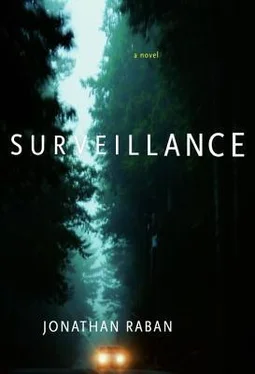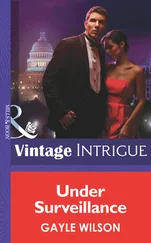“Big mistake,” the landlord said. “He shoulda gone to library or someplace. Kid smart enough to do that stuff, he should know better. Do it from his house…that’s crazy. Why he do that?”
“I think he like wanted to get caught.”
The landlord frowned and shook his head disbelievingly. “Like I say, this kid crazy.”
Lucy, annoyed by the landlord’s too-ready adoption of the criminal point of view — surely not the way to talk to Alida — said, “Do help yourself, Mr. Lee.”
He did so, generously. The golden crust on top made the dish look almost professionally respectable: Lucy thought it a pity that the landlord’s uninvited presence so detracted from what should have been her pride and pleasure in having successfully carried off the recipe.
Still, he praised the food lavishly. “Good cook, Lucy!”
“Thank you, Mr. Lee. Alida?”
“Yummy.”
Looking around the room, the landlord said, “You keep things nice. Real homey.”
“We like to think so.”
He quizzed Alida about her school, then said, “You think about college?”
“Sometimes I do. I want to be a math major.”
“Math, huh?”
“It’s hard to think seven years ahead when you’re eleven,” Lucy said. “People change. By the time you get to twelfth grade, who knows what you’ll want to major in? It might be math, it might be astrophysics, it might be anthropology.”
“Lot of good colleges in the U.S.,” Mr. Lee said. “What college you want to go to?”
“I don’t know. I haven’t like thought about it.”
“Harvard College. That’s good one. You heard of Harvard College?”
“Yeah,” Alida said, carefully forking the green bits out of her macaroni and cheese.
“You want an A-one education, you go to Harvard College.”
Alida shrugged. “Maybe.”
“You need big bucks to pay for Harvard College. Tuition!” He was speaking to Lucy now. “Costs a fortune.”
“So, you have children, Mr. Lee?”
“Me? No. No wife, no kids. Single man!” He reached for the casserole to give himself a second helping. He munched rather noisily for a while, then said, “Been reading what you wrote. Good writing, Lucy! Bill Gates, he knows what it takes to go from good to great. Can learn a lot from a guy like him.” To Alida, he said, “Bill Gates went to Harvard College.”
“He dropped out,” Lucy told him.
“What do you mean?” Alida said.
“He didn’t finish. He never got to graduate. He quit in his junior year there.”
“Like me.” The landlord eyed the casserole for the third time. “Never got to graduate from college!”
“So where were you, Mr. Lee?”
“Seattle Central Community College. Took class there once, Business Studies. Shoulda gone to Harvard.” He laughed. “But I was poor man then. Couldn’t pony up no tuition.”
The notion of him as a Harvard student was so absurd that Lucy giggled out loud.
“Is true!” Mr. Lee said, grinning. “Hey, I live like dirt once. Work my way up, right from the bottom. Not like Bill Gates. More like Sam Walton.” He turned to Alida. “Wal-Mart guy. When Sam a kid back in Depression time, his family didn’t have but just one cow. Every morning, five o’clock, this kid be out there milkin’ the cow. Then he bottle that milk and sell it all over Oklahoma on his bike. That how he got started. Know Wal-Mart’s turnover right now? Two hundred, eighty-five billion dollars!”
After a longish pause, Alida was gracious enough to mumble, “Cool.”
It took the landlord an age to leave. Then Lucy realized he’d never gotten around to taking measurements for the damn video monitor.
FINN’S EMPTY CHAIR was the focal point in Social Studies. They were meant to be doing this new project about George Vancouver and the Northwest Indians, but no one was paying attention. His absence from the room only made the cyberterrorist more present in everybody’s mind. In the minutes before the eight o’clock bell, all the talk was of Finn’s scarifying future. Most thought he’d spend years — behind bars! — in a juvenile detention center. Alida tried to say roughly what her mom had told her, but that wasn’t nearly exciting enough for the other kids.
“If he doesn’t talk, they’ll probably torture him,” Alex said in a matter-of-fact voice.
“He’ll go to trial.”
“He’ll be incarcerated. ”
“He’ll have to spend the entire rest of his life paying for what he did. They’ll take it off his salary every month. He’ll never even have a car !”
“He’ll have to work on road gangs, wearing a yellow jacket with Prisoner on it. He’ll be picking up litter.”
“Can you imagine Finn like really, really thin?”
In class, Mrs. Milliband was saying, “Then Lieutenant Peter Puget and his men rowed ashore, and that was their very first meeting with the people we now call the Coast Salish Indians.”
Who cared ?
MIRACULOUSLY, the FedEx package arrived mid-morning. Given the time difference, Marjorie Tillman must have moved like greased lightning to copy the photo and deliver it to the Norwich FedEx office. Lucy tore the flap of the package twice in her haste to get it open.
Two sheets of stiff cardboard enclosed a dust jacket of Augie’s book, a print of Mrs. Tillman’s original photograph, and four pages of small, old-fashioned, scrolly, blue-ink handwriting. Lucy grabbed the photo and immediately saw that it wasn’t — quite — identical to the one on the book, but could easily have been the next picture on the roll: boy, barbed wire, grass in the foreground, dirt in the background. The light had changed between the two shots, though. In Marjorie’s version, the boy — who sure looked like Augie — was squinting into the sun, and his shock of pale hair had changed shape a little, probably because of the wind.
She went to Alida’s room to dig out the magnifying glass that had been Alida’s constant companion when she was eight and deeply into Harriet the Spy. She found it in the third drawer down in the homework desk: Alida, the neat freak, always kept her drawers in perfect order.
It was hard to be sure, but under the glass she thought she saw discrepancies. Marjorie’s copy was nearly as good as an original, but both had clearly been taken with a Box Brownie’s crappy little lens. Even fresh from the processors more than sixty years ago, their resolution would have been smudgy. The dust jacket version wasn’t helped by its multitude of creases — creases that both served to authenticate its age, and now made it infuriatingly more difficult to read. But, look, wasn’t that barbed wire more widely spaced, and somehow spikier, in the photo on the book than it was in the copy?
And the boy himself: on the book his features were relatively sharp, but in the other they were almost whited-out from overexposure. The rule in those days — reverently observed by Lucy’s dad long afterward — was that the photographer had to keep the sun over his left shoulder to get the best picture, so a smidge too much sunlight could reduce a human face to a cipher. The boy — if it was the same boy — had obviously moved. In the first, his feet were hidden in the grass; in the second, Lucy could see the tops of a pair of sandals.
Suppose, now, that she were looking at two Latvian boys, both the same age, both Oxfam starvation cases. Substitute Chinese or African-American for Latvian, and would she expect to be able to securely tell them apart? How do you tell one munchkin from another?
It was the setting that was so damning. But then again, weren’t dirt and barbed wire part of the basic vocabulary of wartime, like Augie’s and Wilkomirski’s rats? A single fencepost would’ve helped confirm that the fence was the same fence, but in both shots there was only wire.
Читать дальше












